Cataracts and Cataract Surgery
Introduction
At Focus Referrals we offer cataract assessment consultations and cataract surgery. If you are considering cataract surgery for your pet it is very important that you first arrange a consultation. This very detailed assessment looks at the suitability of your pet to undergo cataract surgery. As you will read below, not all animals with cataracts are good candidates for surgery.
| Approximate costs involved inc. VAT: | For 1 eye | For 2 eyes |
|---|---|---|
| Cost of initial consultation | £240.00 | £240.00 |
| Cost of cataract surgery | £4000-4100 | £5000-5100 |
| Cost of aftercare for the first 6 months | £1000-1300 | £1000-1300 |
What is the lens?
The lens is a normally clear structure that sits behind the iris/pupil. The main function is to focus the light entering the eye onto the retina at the back of the eye.
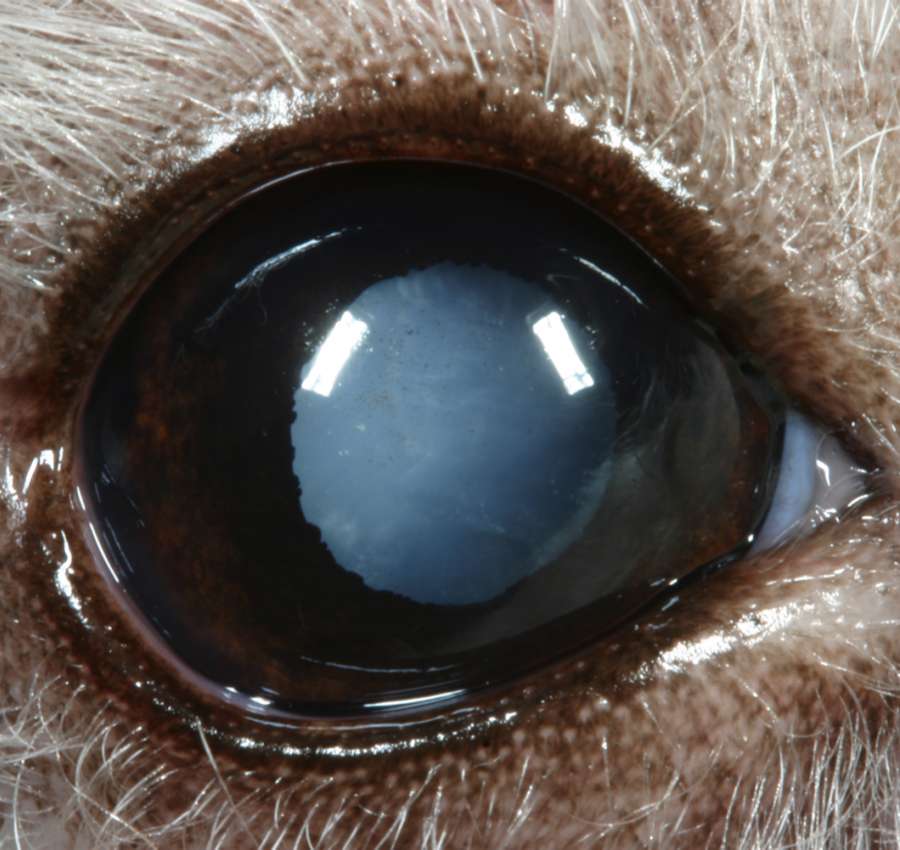
A cataract is when the lens becomes cloudy and opaque. This means the pupil goes from being black to white (see above and below). As a result the light entering the eye cannot focus onto the back of the eye/retina and the affected eye can become blind. Cataracts can affect one or both eyes and often are progressive meaning they get worse.
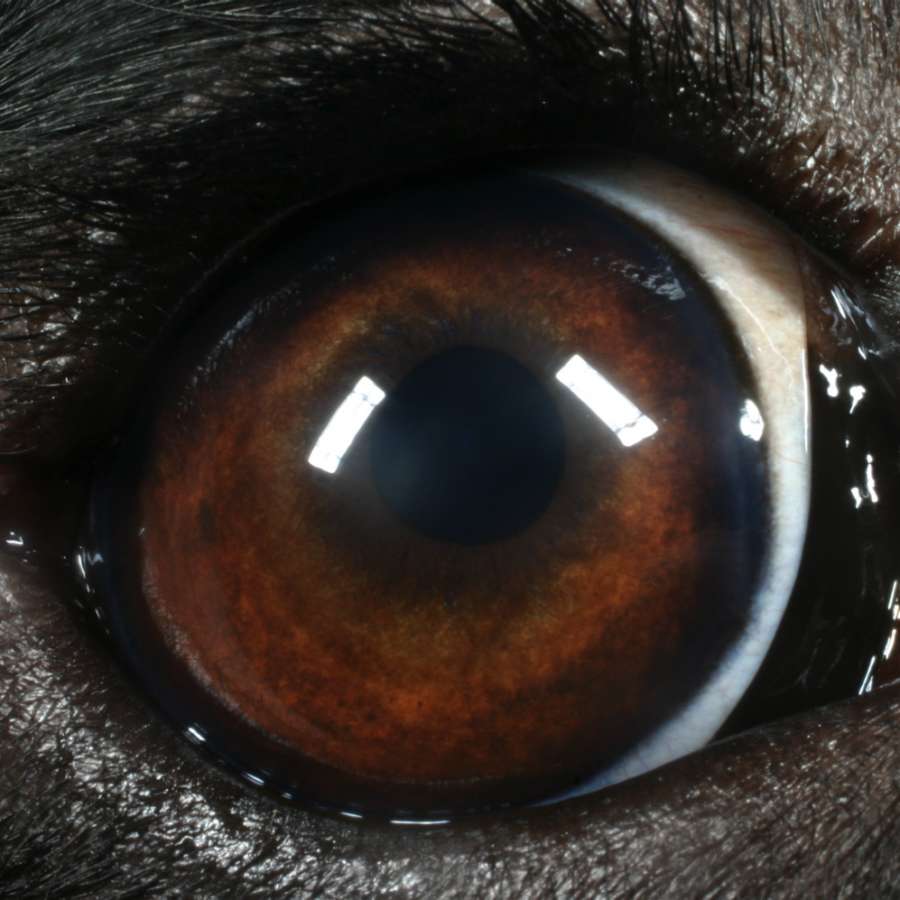
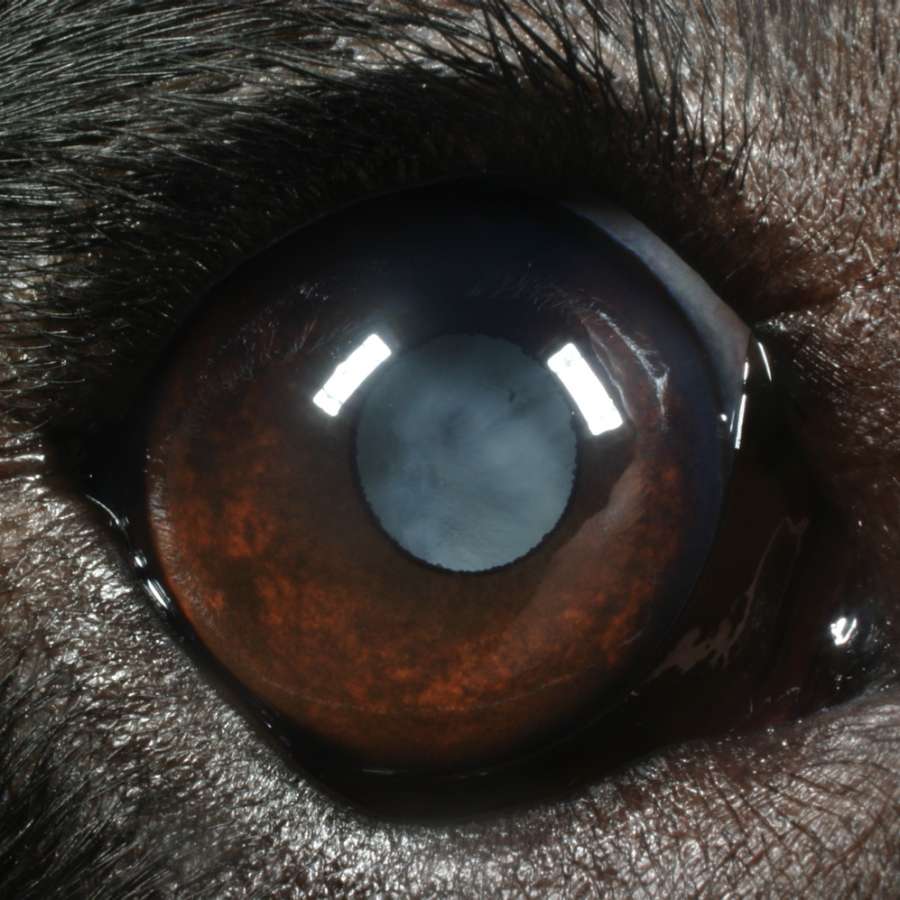
What causes cataracts?
In some cases we do not know the cause but cataracts are generally more common in older animals. Other causes include breed-related hereditary disease, diabetes or a retinal problem.
What is the treatment for cataracts?
Currently surgery is the only effective treatment for cataracts. However, not all animals with cataracts are suitable candidates to undergo surgery. Therefore it is very important if your pet has cataracts and you are thinking about surgery, that you seek a consultation with a specialist. The specialist will perform a very detailed examination on your pet and discuss all possible options with you.
How does the surgery work?
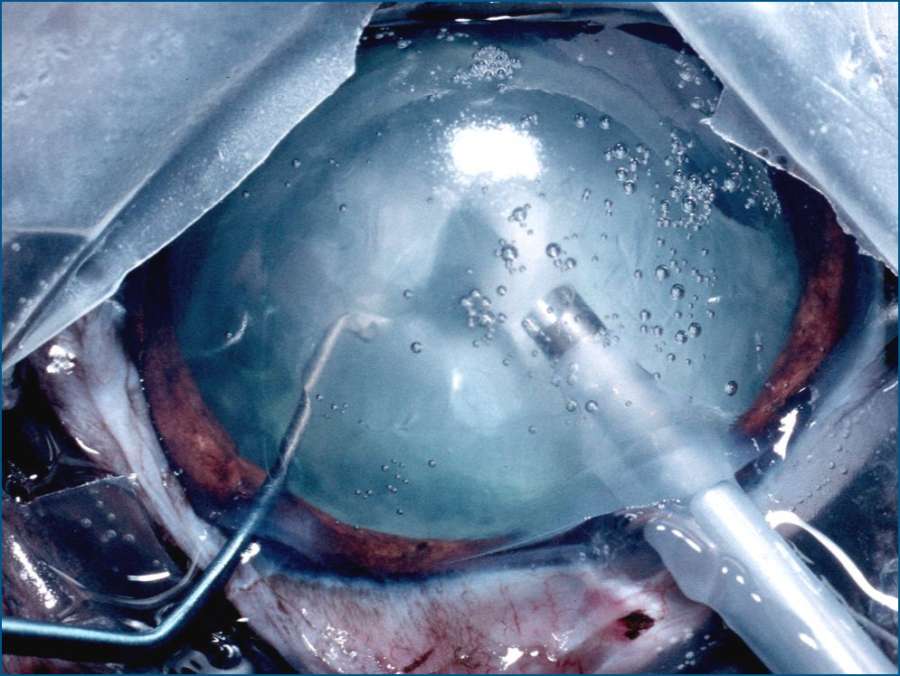
Your pet would be admitted in the morning of the scheduled day. In all non-diabetic animals we advise that no food be given on the day of the operation but water is fine. Diabetic dogs require special management and this will be discussed prior to surgery. Your pet is then given regular eye drops to dilate the pupils and a mild sedation. Ultrasound scans of the eye(s) are then performed to ensure that the retinas have not detached. If a detachment were identified then we would normally not proceed with the cataract surgery.
A general anaesthetic is given and we monitor your pet very carefully whilst he/she is asleep. This keeps the risks of the anaesthetic as low as possible. Your pet is then positioned onto his/her back and with the aid of an operating microscope and microsurgical instrumentation the cataract surgery is performed.
Two tiny incisions are made into the cornea, which is the clear part of the eye. The eye is then inflated using a special clear gel called viscoelastic and a central window is carefully cut out of the front part of the lens. It is through this window that the cataract is liquefied and removed – this process is called phacoemulsification and is the same technique used to remove cataracts in people.
If the ‘bag’ in which the cataract sits, remains intact then an artificial plastic lens can be implanted into the eye. These lenses are made especially for dogs and cats and in theory mean that your pet will have similar vision as to before the cataract developed. However, if the bag is damaged then a plastic lens cannot be implanted. In these cases the animal’s vision will be better than with the cataract, but will essentially be ‘long-sighted’ i.e. things close up will be blurred but clearer in the distance.
The tiny incisions are then closed using very fine sutures, which dissolve and do not require removal. We routinely operate on both eyes at the same time but tend to recommend one eye only in higher risk patients. This will be discussed in much more detail with you at the time of the initial consultation.
Most patients go home the same evening and require a check-up the next day. Although the majority of our patients that undergo cataract surgery can see well straight away it may take several weeks in some cases to regain their full visual potential.
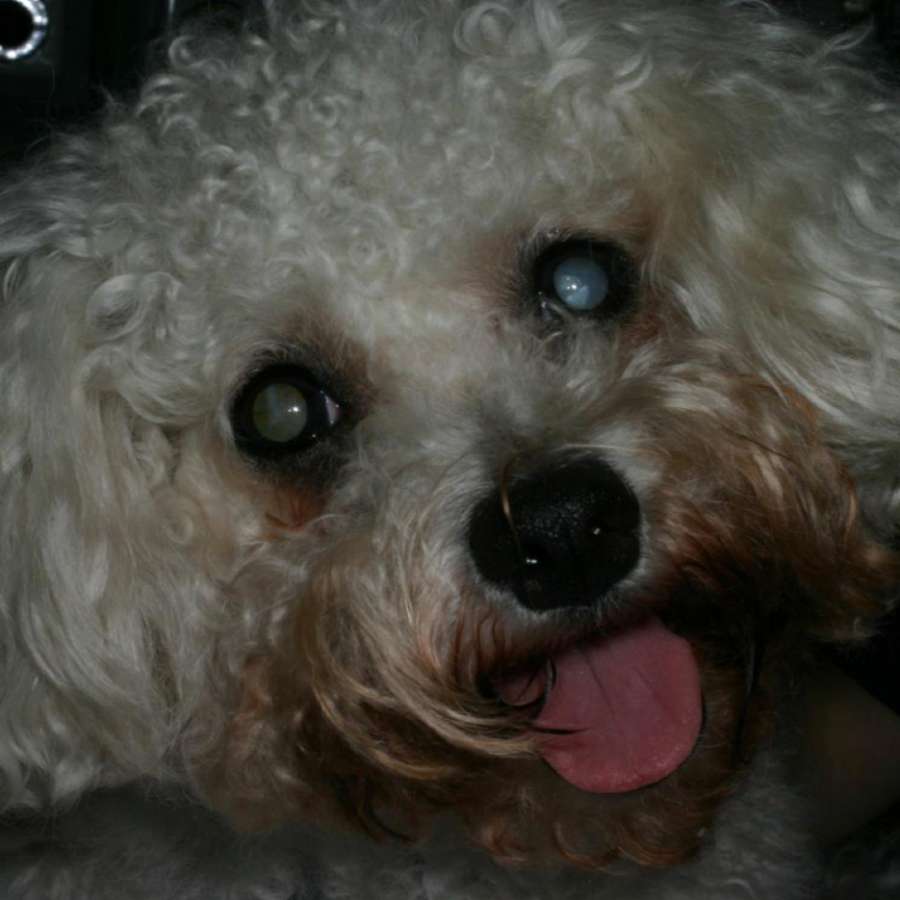
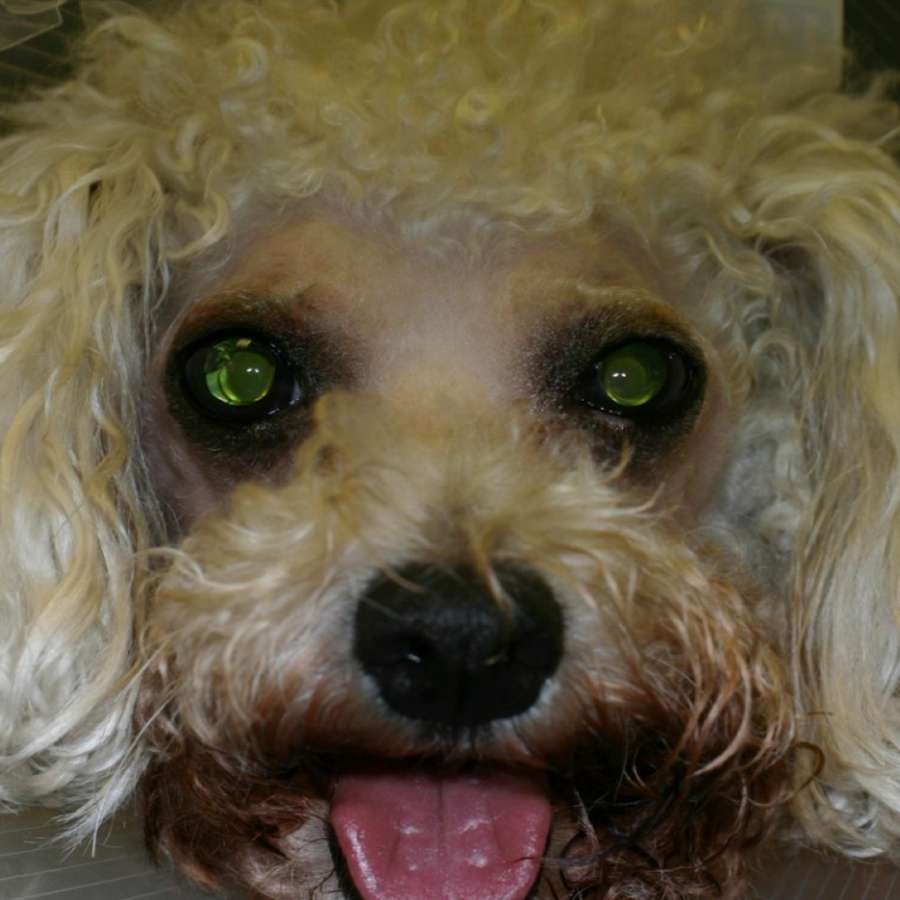
What happens after the surgery?
The aftercare for cataract surgery is very important. This is because all animals develop inflammation in the eyes following cataract surgery and this is especially true in dogs when compared to humans. As a result your pet will require very intensive eye drops as well as oral medications. Initially your pet will require drops up to 12 times daily but this intensive period is typically for no more than 7 days after the operation, at which time the number of drops required reduces.
Your pet will have to be kept quiet for approximately 2 weeks following the surgery and ideally not pull on a lead. Using a crate at home and a harness instead of a collar/lead are good ideas. In addition your pet will have to wear a protective buster collar to ensure he/she does not rub the eyes.
We normally re-examine your animal at 1, 3, 6, 10 and 18 weeks after the surgery but if there are any complications these check-ups may be more frequent. As a general rule we continue to monitor your pet for the rest of its life and re-assess them every 6 to 12 months. This ensures that any long-term complications are detected early, which is important in obtaining the best possible outcome for you and your animal.
What is the overall success rate of cataract surgery?
We generally quote a success rate of 90% in dogs who undergo cataract surgery. Another way of putting this is that 10% or 1 in 10 dogs do not have a successful outcome and cannot see in the operated eye after surgery.
Why choose Focus Referrals?
You have a choice of veterinary referral centres to seek further advice and treatment of cataracts. At Focus Referrals, a small independent referral service, we believe that the following factors make us stand out as the best choice for this procedure:
- Mike Rhodes, a diploma holding specialist in ophthalmology, has vast experience of this procedure having carried out over 600 cataract surgeries during his career. All cataract surgeries carried out at Focus Referrals are directly overseen by Mike with a team approach to the procedure.
- We carefully assess each patient to check that it is definitely the right decision to proceed with the surgery. For this reason we do not include the consultation in a 'bundle' price as we will not operate unless this is the right thing for your pet and you.
- We will allow plenty of time to honestly discuss the benefits and risks for your individual pet and inform you fully of the commitments required after cataract surgery.
- We have invested in state-of-the-art facilities and an environment specifically designed for the care of ophthalmology patients.
- As a small, ophthalmology only clinic, we are able to offer one to one care for your pet in a calm environment. Your pet will be treated as an individual on the day of their visit and cared for by our team of pet-owning professionals.
- At Focus Referrals, we carefully price this complex procedure to reflect the level of expertise and quality of facilities used to care for your pet. As an independent clinic we want to feel comfortable that we are charging an ethical and reasonable price. We transparently display our prices on our website and are happy to discuss a detailed estimate directly with you.
- Rather than compiling commercial packages and advertising, we rely on the trust of referring vets and previous clients for recommendations.
If you’d like to find out more about how Focus can treat your dog’s (or cat’s) cataracts, please ask your vet to contact us or give us a call on 01295 238160.

